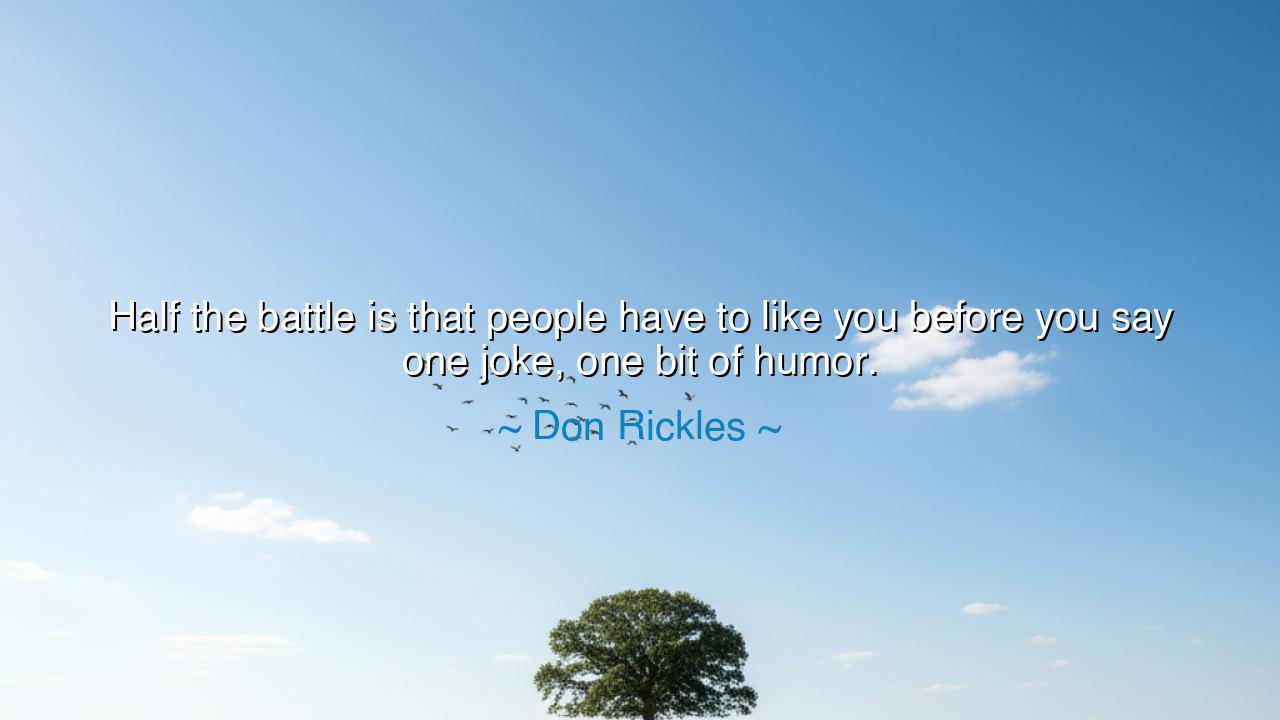
Half the battle is that people have to like you before you say
Half the battle is that people have to like you before you say one joke, one bit of humor.






When Don Rickles declared, “Half the battle is that people have to like you before you say one joke, one bit of humor,” he spoke not only as a master of comedy but as a sage of the human heart. His words, though born from the world of laughter and performance, carry the weight of timeless truth. He reminds us that the power to move others—through humor, art, or speech—depends not merely on skill or cleverness, but on connection. For no words, no wit, no brilliance can reach a heart that is closed. To make others laugh, to make them listen, one must first make them feel safe in one’s presence. And so, Rickles teaches us that likability is not a trick of charm, but the foundation of trust—the first bridge between souls.
The meaning of this quote stretches far beyond the stage or the microphone. It is about the unseen bond that must exist between speaker and listener, giver and receiver. Rickles, whose humor often cut close to the bone, understood that his audience had to know his heart before they could endure his jabs. His comedy, filled with mockery and mischief, could have easily turned to cruelty in lesser hands. Yet people adored him. Why? Because beneath his words burned warmth, humanity, and love. The people felt it before he even spoke. In their laughter was not pain, but recognition. They laughed because they knew he meant no harm. That was the secret—the invisible preparation before the punchline: the creation of goodwill.
To be liked, in Rickles’ sense, does not mean to seek approval or flattery. It means to radiate authenticity, to show the audience—whether of one person or a thousand—that you are real. The ancients would have called this ethos, the character that gives speech its moral power. A man whose words are clever but whose heart is cold can never win the trust of his listeners. But one who speaks with sincerity, one whose intent is felt before his voice is heard—he commands the room without force. This is what Don Rickles knew instinctively. Before the laughter, there must be rapport. Before the jest, there must be kindness.
History offers many who understood this law of the heart. Consider Abraham Lincoln, a man who led a nation divided. His speeches were not only filled with reason but also with humor and humanity. Before he argued, he disarmed; before he taught, he smiled. His self-deprecating wit, his gentle jokes about his own awkwardness and appearance, softened even his harshest critics. By the time he spoke of freedom and unity, people were already inclined to listen, because they liked him. They sensed the goodness behind the words. In this way, Lincoln, like Rickles, proved that the first victory in any battle of persuasion or performance is not intellectual, but emotional—it is to win the heart before the mind.
And yet, how many fail to see this? In our time, many rush to speak before they have earned the right to be heard. They wield words like weapons, sharp but hollow. They try to impress with intelligence, forgetting that intelligence without empathy alienates rather than connects. Humor, leadership, art, and communication—all are bound by the same law: the listener must feel that you care for them. For people do not remember what you said; they remember how you made them feel. When Rickles says that “half the battle” is being liked, he acknowledges that without that foundation of warmth, even the finest joke, the truest truth, will fall lifeless to the ground.
There is also a deeper humility in his wisdom. For Rickles, likability was not something one demanded, but something one earned. It comes from how you look at others, how you respect them, how you make them feel seen. The great Socrates, when teaching in the markets of Athens, did not simply proclaim truths; he asked questions, invited others to think, and met them where they stood. His humor and humanity made even his opponents trust him. This is the same eternal principle: people must like you before they can receive your truth. The messenger must be worthy before the message can take root.
And so, my listener, take this lesson as both challenge and invitation: before you speak, before you act, seek first to connect. When you walk into a room, carry warmth in your eyes. When you speak, let kindness precede your cleverness. If you wish to lead, to teach, or even to make others laugh, let them feel your respect before they hear your words. For trust is the soil in which all meaning grows, and without it, no seed—no joke, no wisdom—will bloom.
In the end, Don Rickles gives us more than a performer’s secret—he gives us a philosophy of life. To be liked is to open the door to communion, to human understanding. It is to say: I see you. I honor you. Now let us share in this moment together. And whether that moment is one of laughter or learning, its magic lies in this simple truth: that every heart opens first not to brilliance, but to kindness. Therefore, let all your words, your humor, your art, and your actions begin with that warmth—and you will find that half the battle is already won.






AAdministratorAdministrator
Welcome, honored guests. Please leave a comment, we will respond soon